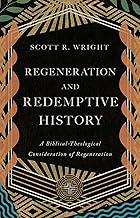
Scott R. Wright
Reviewed by: Zachary C. Herbster
Regeneration and Redemptive History: A Biblical-Theological Consideration of Regeneration, by Scott R. Wright. Reformed Forum, 2023. Paperback, 222 pages, $27.99. Reviewed by OP pastor Zachary C. Herbster.
When Dorothy enters Oz, she’s not “in Kansas anymore.” She has entered a new world. Christians experience something similar when we’re “born again” or “regenerated.” But this is no dream. As Paul says in 2 Corinthians 5:17: “Therefore, if anyone is in Christ, he is a new creation.” We have entered a new world.
Scott R. Wright’s Regeneration and Redemptive History contends that Christians inhabit a renewed spiritual environment. Christ’s historical work of redemption has brought the church into a world where “believers breathe the air from the age to come” (50). Wright defends his thesis by offering a study of the doctrine of “regeneration” or “new birth” in the context of Jesus Christ’s life, death, resurrection, and ascension. Theologians call this focus the historia salutis, or the “history of salvation.” If Christ did not accomplish salvation on a real cross in real history, then we have no hope (1 Cor. 15:14).
When we hear the term “regeneration” or “born again,” however, we think about our individual coming to Christ, or “conversion.” Theologians call this focus the ordo salutis, or the “order of salvation.” In chapter 1, Wright traces this narrow association of “regeneration” as a step within “conversion” to the Synod of Dort, a Reformed ecclesial assembly in the Netherlands in 1618–1619. To safeguard God’s sovereignty in salvation from human contribution (i.e., Arminian” theology), the Synod of Dort affirmed that only the “regenerating grace of the Holy Spirit” can convert sinners (Canon III/IV.3).
While this doctrinal statement is true, Wright notices that, before Dort, Reformed theologians like John Calvin, Zacharias Ursinus, and William Perkins spoke of “regeneration” more broadly as akin to “sanctification” (13–16). To retrieve this broader understanding, Wright examines several biblical texts in chapters 2–7.
In Genesis 3:15, God himself puts enmity between the seed of the serpent and the seed of the woman. His promise to send a Messiah to crush Satan’s kingdom is the historical foundation for Old Testament saints like David receiving new hearts at enmity with the serpent. For example, David’s cry in Psalm 51:10 for a “right spirit” is not a request for a jolt of contextless Spirit-lightning, but a plea for a more sanctified trust in the coming work of the Christ to atone for his sins finally and completely (79). David longs to breathe in more deeply the “eschatological” or “end times” air of the new heavens and new earth, wafting back in time through both Testaments.
This final kingdom of God is what Jesus calls “the regeneration” in Matthew 19:28. “The regeneration,” therefore, is not primarily “my” regeneration or “yours,” but the fulfillment of Christ’s historical work to reign as King forever (103). Just as Jesus is the “way, truth, and life,” so too he is the regeneration. Christ’s finished work electrifies the Christian heart at every beat: this is regeneration.
While Wright’s book ends with several applications, I note just one. His renewed emphasis on the broad and historical aspects of regeneration is a blessing to Christian assurance. Confidence in salvation rests not upon my subjective experience of being “born again,” but upon Christ’s objective work on the cross and his resurrection to secure my salvation
Wright’s book will help pastors preach more redemptive-historically about regeneration, particularly from passages like Genesis 3:15, Psalm 51, John 1:9–13, and John 3:1–8. Therefore, saints will breathe in more deeply their new world air, energizing them to tell others about the power of Christ the Regenerator!
April 06, 2025
Sunday Matters: 52 Devotionals to Prepare Your Heart for Church
March 30, 2025
On the Trail with a Missionary
March 23, 2025
Midnight Mercies: Walking with God Through Depression in Motherhood
March 16, 2025
March 09, 2025
Zwingli the Pastor: A Life in Conflict
March 02, 2025
February 23, 2025
© 2025 The Orthodox Presbyterian Church